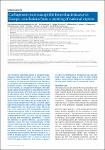Carbapenem-non-susceptible Enterobacteriaceae in Europe: conclusions from a meeting of national experts
Grundmann, Hajo
Livermore, D. M.
Giske, C. G.
Canton, R.
Rossolini, G. M.
Campos, J.
Vatopoulos, A.
Gniadkowski, M.
Toth, A.
Pfeifer, Yvonne
Jarlier, V.
Carmeli, Y.
The emergence and global spread of carbapenemase-producing Enterobacteriaceae is of great concern to health services worldwide. These bacteria are often resistant to all beta-lactam antibiotics and frequently co-resistant to most other antibiotics, leaving very few treatment options. The epidemiology is compounded by the diversity of carbapenem-hydrolysing enzymes and the ability of their genes to spread between different bacterial species. Difficulties are also encountered by laboratories when trying to detect carbapenemase production during routine diagnostic procedures due to an often heterogeneous expression of resistance. Some of the resistance genes are associated with successful clonal lineages which have a selective advantage in those hospitals where antimicrobial use is high and opportunities for transmission exist; others are more often associated with transmissible plasmids. A genetically distinct strain of Klebsiella pneumoniae sequence type (ST) 258 harbouring the K. pneumoniae carbapenemases (KPC) has been causing epidemics of national and international proportions. It follows the pathways of patient referrals, causing hospital outbreaks along the way. Simultaneously, diverse strains harbouring New Delhi metallo-beta-lactamase (NDM-1) are repeatedly being imported into Europe, commonly via patients with prior medical exposure in the Indian subcontinent. Since the nature and scale of carbapenem-non-susceptible Entrobacteriaceae as a threat to hospital patients in Europe remains unclear, a consultation of experts from 31 countries set out to identify the gaps in diagnostic and response capacity, to index the magnitude of carbapenem-non-susceptibility across Europe using a novel five-level staging system, and to provide elements of a strategy to combat this public health issue in a concerted manner.
Dateien zu dieser Publikation
Keine Lizenzangabe
Verwandte Publikationen
Anzeige der Publikationen mit ähnlichem Titel, Autor, Urheber und Thema.
-
2014-12-04ZeitschriftenartikelLow Rates of Antimicrobial-Resistant Enterobacteriaceae in Wildlife in Taï National Park, Côte d’Ivoire, Surrounded by Villages with High Prevalence of Multiresistant ESBL-Producing Escherichia coli in People and Domestic Animals Albrechtova, Katerina; Papousek, Ivo; Nys, Helene de; Pauly, Maude; Anoh, Etile; Mossoun, Arsene; Dolejska, Monika; Masarikova, Martina; Metzger, Sonya; Couacy-Hymann, Emmanuel; Akoua-Koffi, Chantal; Wittig, Roman M.; Klimes, Jiri; Cizek, Alois; Leendertz, Fabian; Literak, IvanAntimicrobial resistance genes can be found in all ecosystems, including those where antibiotic selective pressure has never been exerted. We investigated resistance genes in a collection of faecal samples of wildlife ...
-
2015-11-12ZeitschriftenartikelCarbapenemase-producing Enterobacteriaceae in Europe: assessment by national experts from 38 countries, May 2015 Albiger, B.; Glasner, C.; Struelens, M. J.; Grundmann, Hajo; Monnet, D. L.; Eckmanns, TimIn 2012, the European Centre for Disease Prevention and Control (ECDC) launched the ‘European survey of carbapenemase-producing Enterobacteriaceae (EuSCAPE)’ project to gain insights into the occurrence and epidemiology ...
-
2014-09-29ZeitschriftenartikelDetection of OXA-48-type carbapenemase-producing Enterobacteriaceae in diagnostic laboratories can be enhanced by addition of bicarbonates to cultivation media or reaction buffers Studentova, Vendula; Papagiannitsis, Costas C.; Izdebski, Radoslaw; Pfeifer, Yvonne; Chudackova, Eva; Bergerova, Tamara; Gniadkowski, Marek; Hrabak, JaroslavCarbapenemase-mediated resistance to carbapenems in Enterobacteriaceae has become the main challenge in the treatment and prevention of infections recently. The partially unnoticed spread of OXA-48-type carbapenemase ...

